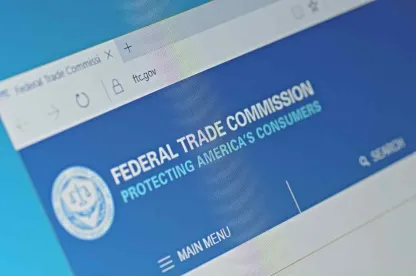“Dark patterns” – user interfaces that are designed, intentionally or unintentionally, to influence user decision making – have been increasingly on the Federal Trade Commission’s (FTC or Commission) radar. As we previously reported, the FTC held a workshop earlier this year to examine, among other things, how dark patterns affect online user behavior and whether additional rules, standards, or enforcement efforts are needed to protect consumers. Recently, negative option marketing, a common marketing method used by companies that includes automatic renewals, continuity plans, free-to-pay or fee-to-pay conversions, and prenotification plans, came under scrutiny after the FTC received thousands of complaints from consumers. In response, on October 28, 2021, the FTC announced a new Enforcement Policy Statement Regarding Negative Option Marketing (Enforcement Policy Statement or Statement) which makes clear that if negative option offers are made deceptively or misleadingly, they can expose offending businesses to enforcement actions including civil penalties.
The FTC describes negative option marketing as “an offer that contains a term or condition under which the seller may interpret a consumer’s silence or failure to take affirmative action to reject a good or service or to cancel the agreement as acceptance or continuing acceptance of the offer.” Negative option marketing schemes are commonplace and, as the FTC notes, can offer benefits to both consumers and businesses. However, the Commission warns that companies using unfair or deceptive negative option practices are “a persistent source of consumer harm, often saddling shoppers with recurring payments for products and services they did not intend to purchase or did not want to continue to purchase.” The Commission reminds businesses of their obligations under the laws that govern online sales, principally Section 5 of the FTC Act, but also the Restore Online Shoppers’ Confidence Act (ROSCA), the Telemarketing Sales Rule, the Use of Prenotification Negative Plans Rule, the Postal Reorganization Act, and the Electronic Funds Transfer Act.
To provide businesses with a roadmap for compliance with the various statutes and rules, the Enforcement Policy Statement builds on previous FTC guidance and focuses on three principal areas: disclosure; consent; and cancellation.
Disclosure: Businesses are advised to disclose, clearly and conspicuously, all material terms of an offer, including:
-
Any express or implied claims;
-
Any material terms related to the product or service that are necessary
to prevent deception, regardless of whether those terms directly relate to the terms
of the negative option offer; -
Charges for the product or service, or that charges will increase after their trial period ends, and, if applicable, that charges recur unless the consumer takes appropriate steps to stop them;
-
Each deadline by which the consumer must act to stop the charges;
-
The amount or range of costs the consumer will be charged or billed and the frequency of charges;
-
The date(s) each charge will be submitted for payment; and
-
All information necessary to cancel the contract.
The Statement also offers advice on how to ensure that negative option offers meet the FTC’s expectations for “clear and conspicuous” disclosures.
Consent: Marketers must obtain a consumer’s express consent. The Statement offers the following guidance:
-
The negative option seller must obtain a consumer’s unambiguously affirmative consent to the negative option offer and must accept it separately from the rest of the transaction;
-
The seller must not include any information that interferes with, detracts from, contradicts, or otherwise undermines the ability of consumers to provide their express informed consent to the negative option feature;
-
The seller must obtain a consumer’s unambiguously affirmative consent to the entire transaction; and
-
The seller must be able to verify consent.
Cancellation: Cancellation processes should be easy for consumers. Negative option sellers must provide a simple, reasonable, and effective means for consumers to cancel their contracts. The Statement advises companies to ensure that:
-
Cancellation mechanisms are at least as easy to use as the method a
consumer used to initiate the negative option feature; -
Cancellation mechanisms are made available through the same medium as the negative option offer; and
-
Cancellation requests that comply with the company’s procedures will be honored, and the company will not interfere with the effectiveness of its cancellation processes.
The Commission approved the Enforcement Policy Statement by a 3-1 vote. Commissioner Christine S. Wilson voted no and issued a dissenting statement objecting to guidance being issued during an open rulemaking on the topics covered in the Enforcement Policy Statement. While expressing general support for the guidance itself, her objection was grounded in concerns that issuance of the guidance appeared to “short-circuit” the ongoing rulemaking. Commissioner Noah J. Phillips voted yes and issued a concurring statement applauding the Enforcement Policy Statement as a helpful framework to explain the FTC’s expectations of businesses engaging in negative option marketing offers. He pointed out that negative option marketing rulemaking implicates the Magnuson Moss Warranty-Federal Trade Commission Improvements Act, and that “even though the Commission has begun this process, this kind of rulemaking sensibly includes regulatory guardrails that have certain timing constraints and could require the consumption of substantial agency resources. The policy statement provides immediate guidance to industry, without the wait.”
Negative option sales and techniques are only one example of how the FTC’s larger interest in so-called “dark patterns” might come into play in practice. Businesses that advertise negative option offers should familiarize themselves with the latest Enforcement Policy Statement. If done right, negative marketing offers should provide the necessary convenience and clarity to consumers, reduce customer acquisition costs, and increase sales.





 />i
/>i

